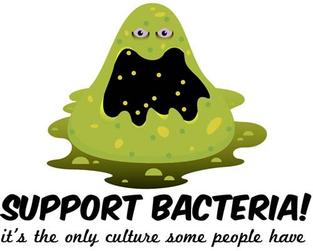|
28/9/2014 0 Comments Bacteria: Friend or Foe?Farmstand Apple. Warm Vanilla Sugar. Caribbean Escape. You savvy Bath and Body shoppers may have caught on to what I am thinking about here: soaps and hand sanitizers. Antibacterial ones to be exact. Nowadays we seem to think that every little bit of dirt is the end of the world and must be rid of before some one gets sick. This is actually not the case. I’ve been thinking about writing this post for over a month now and coincidentally I have stumbled upon various articles and documentaries that relate to it without even searching for them! Today I am here to tell you that bacteria, in general, is not the enemy! In fact, without it, we are in trouble.
Did you know that you have more bacteria in your body than human cells? Yes, at a ratio of 10:1 to be exact! In our guts, bacteria flourish and work hard to digest our food and keep our bodies healthy. I also read a really interesting article about Staphylococci. This is a bacteria that is harmful to you if it gets under your skin, however on top of your skin, it has been shown to be an essential part of the immune response! This type of bacteria helps to reduce inflammation from injuries, which in turn speeds up the healing process! When you use antibacterials and antibiotics, you kill not only the bad but also the good bacteria that lives in and on your body. In relation to the staphylococci, that means that without their presence, healing takes longer and inflammation is more prevalent. Unfortunately, these soaps and hand sanis can’t recognize “good” and “bad”, just “all”. You need that good bacteria to keep the bad ones away! An antibacterial ingredient which has been making headlines lately and is found in many hand soaps and hand sanitizers is called Triclosan (liquid soaps and sanis) or Triclocarbon (bar soaps). This is a manmade ingredient that is highly effective at killing bacteria in high doses, however in cosmetic products it is only used at 0.1-0.45% which basically does nothing for you. Having said that, if you are a heavy user of antibacterials that include this in their product, you’re giving yourself a constant, low dose which allows for the harmful bacteria in your body to potentially grow resistant to it – they learn to evolve into a stronger species that are harder to kill. Synthetic ingredients have a “recipe” and are always the same which makes it really easy for micro-organisms to get used to them. Nature, on the other hand, is constantly changing. You can take two of the same kinds of flowers and their make up will never be the exact same: nature cannot get used to nature because it’s never the same. On “The Nature of Things” (yes, I’m old), they studied kids who grow up in very clean environments as opposed to farm kids and Amish kids who grow up around lots of dust and dirt and animals. It didn’t surprise me to see the results but it showed that the ones who were less “clean” had far fewer health problems and almost no allergies. Why? Because they were exposed to things! Yes, the horror! Maybe you haven’t thought about it before but think about it now: If your body is never exposed to something, how is it supposed to know how to deal with it? It doesn’t, so instead it goes into panic mode. Hence reactions like allergies. Did you ever eat sand or mud as a child? How about glue? Did anything make it to your mouth that technically shouldn’t have? And you’re still alive and kicking! Point made. I could write pages and pages about this. And in fact, I’m going to for my final research paper before becoming certified. For now, I will leave you with this: 1) Studies have proven that washing your hands with regular soap and water is equally as effective as using antibacterial products. 2) Hand sanitizer doesn’t work unless your hands look clean anyways; it doesn’t clean the dirt off. 3) If you must insist on using antibacterial products, choose those that use a minimum of 60% alcohol Am I saying all bacteria is good? NO. I am by no means saying that you should go back to caveman hygiene, however it might do you some good to step outside your super-sanitary bubble. *While I don’t endorse most of the ingredients in B&B products, their hand sanitizers do not include triclosan, they are an alcohol based product.
0 Comments
Your comment will be posted after it is approved.
Leave a Reply. |
|
Search by typing & pressing enter



 RSS Feed
RSS Feed